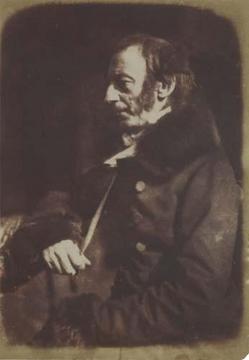April 2.
Yesterday night I went to the soirée of the Marquis of Northampton, where may be found all the savants who are in London. There I saw Prince Albert, to whom Dr. Buckland was showing some microscopic phenomena. The prince is handsome and courteous, and I watched him for some minutes across the table, as a personage of much historical interest. Here I saw Mantell, Captain Sabine, Brown the great botanist, Crabb Robinson (who knew all men, Lamb, Southey, Wordsworth, Madame de Staël, and Goethe), Sir Charles Fellowes, who brought home the Lycian marbles; and many more. Then I went, by an invitation sent me through Milnes, to Lady Palmerston's, and saw quite an illustrious collection, such as only London and Lord Palmerston could collect: princes and high foreigners; Bunsen; Rothschild (that London proverb) in flesh and blood; Disraeli, to whom I was presented, and had with him a little talk; Macaulay; Mr. Cowper, a very courteous gentleman, son of Lady Palmerston, with whom I talked much; and many distinguished dames, some very handsome. . . . Lord Palmerston is frank and affable, of a strong but cheerful and ringing speech. . . .
Last Sunday I dined at Mr. Bancroft's with Lady Morgan and Mrs. Jameson, and accepted Lady Morgan's invitation for the next evening to tea. At her house I found, beside herself (who is a sort of fashionable or London edition of aunt Mary; the vivacity, the wit, the admirable preservation of social powers, being retained, but the high moral genius being left out), Mrs. Gore, of the fashionable novels, a handsome Lady Molesworth, a handsome, sensible Lady Louisa Tennyson, Mr. Kinglake, Mr. Conyngham, a friend of John Sterling's, and others.
Pray, after this ostentation of my fashionable acquaintance, do you believe that my rusticities are smoothed down, and my bad manners mended? Not in the smallest degree. I have not acquired the least facility, nor can hope to. But I do not decline these opportunities, as they are all valuable to me, who would, at least, know how that "other half of the world" lives, though I cannot and would not live with them. I find the greatest simplicity of speech and manners among these people; great directness, but, I think, the same (or even greater) want of high thought as you would notice in a fashionable circle in Boston. Yes, greater. But then I know these people very superficially. . . .
I spend the first hours of the day usually in my chamber, and have got a new chapter quite forward, if it have rather a musty title. Whether to go to France or not, I have not quite determined: I suppose I must, in all prudence; though I have no money, nor any plain way of obtaining any.


Wikipedia links to some of the personages mentioned in the letter:
- Spencer Compton, 2nd Marquess of Northampton
- Albert, Prince Consort
- William Buckland
- Gideon Mantell
- Henry Crabb Robinson
- Richard Monckton Milnes
- Henry John Temple
- Emily Lamb, Lady Cowper
- Lady Morgan
- Catherine Gore
- Louisa (Lady) Tennyson (British, 1819-1882)
- Alexander William Kinglake
Some sources:
A memoir of Ralph Waldo Emerson, by James Elliot Cabot (Cambridge, Printed at the Riverside Press, 1887)
LIDIAN EMERSON page on the Concord Free Public Library site.
Ralph Waldo Emerson; his life, genius, and writings. A biographical sketch, by Alexander Ireland (London, Simpkin, Marshall, 1882)
Emerson at home and abroad, by Moncure Daniel Conway (Boston, J. R. Osgood and company, 1882)
--------------------
*Note
He began this letter on March 8, added to it periodically, and completed it on April 2. It is addressed to his wife back in Concord, Mass. The Concord Free Public Library nas a page on her:
Lidian Emerson
Born Lydia Jackson in Plymouth, nicknamed “Asia” and “Queenie” by her husband, Lidian Emerson (1802-1892) was a spiritual and intellectual woman. She and Emerson shared an essentially stable, happy married life, based on mutual respect and upon love and concern for their children. The second Mrs. Emerson understood and accepted how deeply her husband had cared for his first wife, but at times had difficulty coping with his emotional reserve and with his absences from the household while on lecture tours and trips. She suffered from periods of illness and depression.
A Congregationalist-turned-Unitarian influenced by the philosophy of Swedenborg, Lidian was religiously more conservative than her husband, and critical of Transcendental extremes. She was involved early in the antislavery cause in Concord and later promoted women’s suffrage. She cared deeply for animals and believed in their humane treatment.
Lidian could hold her own conversationally with the many visitors who came to her home to talk with her husband. She was as much a friend as Emerson to many in his circle. She and Henry Thoreau were particularly close. She had a good—sometimes biting—sense of humor, and did not hesitate to engage in repartee.
Although Lidian fulfilled the traditional duties of marriage and motherhood, and although the primacy of her husband’s intellectual life pushed her talents and needs into the background, she was a complex woman of strong mind, character, conviction, and opinion. By and large, their marriage withstood the strain of Emerson’s high-profile life.




No comments:
Post a Comment